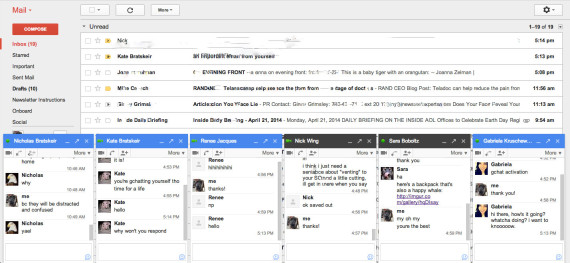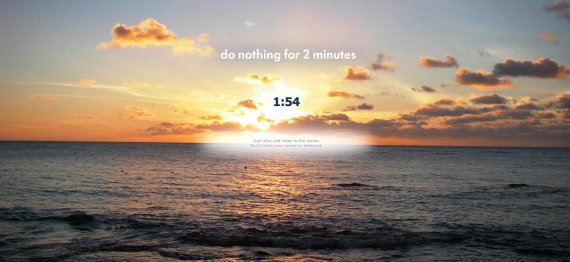
I am a living, breathing victim of productivity traps. I'm scrolling through Tweetdeck, looking at really boring baby shower photos on Facebook and texting a group of people about what we'll do for dinner, all in place of writing about how to be more efficient and less distracted at work. The irony.
But the truth is, I'm not a victim at all. There may be a bunch of obstacles that get in my way every single day, but I have the power to overcome them and get back to work (and you do, too).
What it takes is intention, mindfulness and practice. We've grown accustomed to responding to pop-ups and alerts in real time; we're hooked on them, and today's goal is to learn how to get unhooked. Gemini Adams, author of The Facebook Diet, once told me that "we're addicted to that little notification." Our brain gets a boost when something new arrives in our inbox. But the feeling is equivalent to that of a sugar rush, and -- like sugar -- ultimately does more harm than good.
The harm? While you may spend just a minute or two scrolling through cute cat photos, it'll take much more time for you to truly recover from that distraction and get back to work. Research from the University of California, Irvine sums up the crux of the problem. As Gloria Mark, professor of informatics at the University, told Fast Company, workers are interrupted -- or self-interrupt -- about once every three minutes, and it takes them about 23 additional minutes to get back on track.
In essence, we're wasting a lot more time than we're conscious of wasting. Mark's research nods to the fact that multitasking effectively is just not possible. When you think, "Oh, I'll just check Facebook for a sec while writing this memo," you are signing up to perform two very separate actions. You can't do both at once -- your brain cannot handle it -- and you're the one who loses, because neither activity gets your full attention.
So: We know drifting from a project we need to complete is bad, and we should stay focused. But there is so much to be distracted by behind our little screens. The machines that help us accomplish great things are the same ones getting in our way. But there are, have no fear, opportunities to remedy this. You may not always be able to control the external, off-screen preoccupations that stymie your work productivity (like a loud, nagging co-worker), but here are some ways to take charge of the time-suckers that are in your control.
Why it's hurting you: "Dozens of open tabs signifies either procrastination on a truly epic scale or a chronic inability to focus on an immediate task at hand. Either way, it's not the sign of someone working efficiently," Angus Kidman writes on LifeHacker. Kidman goes so far as to say that you should never have more than nine browser tabs open at once. While that is up for debate, there's no doubt that the teeny, crowded icons become less useful and more distracting as they pile up.
If you refuse to believe that, because you think you defy science and are some sort of master multitasker, know this: Tabs are even making your device inefficient. "Open enough browser tabs and it doesn't matter whether you're running Chrome or Firefox or IE or Safari or Opera: your system is going to slow down and eventually your browser will crash altogether, quite possibly bringing your entire environment down with it," writes Kidman.
The solutions: The simplest thing you can do is to stay on one tab until you are finished with it and then close that tab. I don't know, try it some time.
Other, more realistic things you can do: Find an app or extension that will save the sites open in your tabs for later. This will declutter your browser and give you more time to spend on what needs to be completed in the present moment. Pocket and Readability are two free options that allow you to bookmark or archive a website so you can revisit it when you have the leisure time.
Another solution? Get an extension that'll help control your tab behavior. There are several that will organize your tabs into neat packages, but the point here is to spend less time away from the one tab you need open. Nerdy-sounding tools like Window and Tab Limiter (for Firefox) and Controlled multi-tab browsing (for Chrome) will limit the number of tabs you can have open at a time. A new tab won't open once you've maxed out. This might help you consider what's important to have on your screen, and what's not worth the procrastination.
Why it's hurting you: Oh, there's so much wrong with how we use email. We spend 28 percent of our workweek dealing with email in some way, according to a 2012 report from the McKinsey Global Institute. Let's say you work 260 days a year. That means you spend nearly 73 days monkeying with email. Lord.
First things first, we need to readjust our expectations of how email should work. Office culture has trained us to expect an email response within a matter of hours -- and sometimes minutes. That effectively means we're supposed to be responding to emails all day, while also completing tasks unrelated to email. But, as we've discussed, each pause we make to complete a different task drains efficiency. You think you're "working", but interrupting yourself to do email business is just as bad for you as interrupting yourself to drool over s'mores recipes.
The solutions: To start, you should vow to stop using your inbox as a task list. You'll never get it down to zero (the nature of emails is that they keep on coming), and handwriting your to-do list is a smarter, more effective way to keep track of items and mark them as complete.
Next, rethink the way you incorporate email into your life (remember: this is all in our control). Instead of responding to each new notification (that detrimental sugar rush), devote certain chunks of your day to checking and responding to email -- the same way you'd schedule a meeting. Turn off pop-up windows and vibrations that alert you each time a note hits your inbox. If you're nervous about missing something important, schedule a calendar reminder every 30 minutes or so to prompt you to check your email. This will be much less distracting than constantly looking at your inbox, only to find that Banana Republic is having another sale or some other useless piece of junk that you brain then has to work to recover from.
On the junk mail note: It might be worthwhile to carve out some time to do some weeding. Unsubscribe from newsletters you never open, and find a filtering system that works for you. But make sure to make this an item on your to-do list -- not a dragged-out task you intersperse between your other work.

Why it's hurting you: We've been here before. Gchat forces you to multitask (not possible), makes miscommunication very easy and shoves you off the rails the minute you're on track.
The solutions: Hate to be repetitive here, but block off times of the day in which messaging is appropriate. You have the power to defend your time. If someone needs to reach you, he or she will find a way. You can attempt to go invisible or host an away message of some kind, but chances are, if online chat has whittled its way into your daily habits, it will be a temptation difficult to resist. Instead of chat, when you need to communicate with someone, try picking up the phone or even walking to a colleague's desk when that's an option.
Why it's hurting you: The minute you start getting in the swing of things -- you didn't even want to procrastinate! -- your phone lights up with a text. Then it bings to alert you of a new email and vibrates to remind you about the meeting you're currently sitting in, taunting your brain with its incessant ringing.
The solutions: Easy. Turn it off. Put your phone on airplane mode. Do something to disable those push notifications. It's all very redundant: When you're at your desk, you don't need your phone to alert you of an email. Here is a great guide to pruning your notifications to stop distracting you. You can rely on those 30-minute calendar reminders you've vowed to schedule instead.
Why it's hurting you: You just can't focus. With all of these distractions, it's hard to imagine how you ever would. The tabs, the accumulating notifications, the friend nagging you about happy hour, all in the space of an enclosed little screen is, to put it lightly, overwhelming.
The solutions: First, let's take a deep breath together.
All right. You can start with a few tools that'll help control your at-work behavior. Extensions like Nanny, Strict Workflow and the ironically named Freedom restrict you from visiting certain websites based on your selected preferences.
If you find yourself really unable to focus on a single thing, take it as a sign that your brain needs a little break (after all, it's had to recover so many times today). It sounds counterintuitive, but taking breaks throughout the day will actually make you more productive, less stressed and maybe even a little happier. If you find yourself bogged down, get up and move around. Just a little bit of movement can do wonders. If you can't get away from your trusty swivel chair, find assistance from online tools that prompt you to do absolutely nothing.
Like the site Do Nothing For 2 Minutes, for example. 
The smart, simple window asks you to be still for just two minutes. "Just relax and listen to the waves," it reads. "Don't touch your mouse or keyboard." It sounds elementary, but it can be challenging to "just be" with a piece of technology that has an infinite number of ways to sizzle your brain. Try it out, reboot then get back to work.
